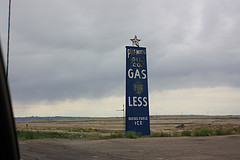Why Should I Care About New Fuel Economy Standards? Because Money Is Nice To Have
Don’t you just loooove watching the dollars and cents tick up as the gallons slowly glug into your car’s gas tank? No you don’t, because no one likes spending large chunks of change to fuel their vehicles. And maybe hybrids or electric cars don’t have all the bells and whistles you’ve come to expect. What’s a discerning, wallet-conscious consumer to do?
There’s good news on the horizon, as our benevolent overlords at Consumer Reports noted yesterday during a special forum on fuel economy and the latest trends in fuel-efficient cars and trucks. Yours truly was there and I can tell you, it’s pretty interesting stuff.
See, higher fuel economy standards passed by the Obama Administration — the Corporate Average Fuel Economy or CAFE rule — will have new cars boasting window stickers of about 40 mpg by 2025.
That will save about 30 billion gallons of gasoline by that time, saving consumers around $326 billion to $451 billion over the average lifetime of a new vehicle. It’ll also cut 2 billion metric tons of greenhouse gas emissions as well, improving air quality for everyone.
So what will you save with these new fuel-efficient cars? It could mean a tidy bunch of cash in your pocket — about $7,300 in fuel savings over the 15-year lifespan of the average new vehicle. That’s despite an upfront cost of about $1,800 more to buy the new vehicles that will begin rolling out in 2016 to meet the new tough standards.
Even better, the cars will still be safe and consumers will be able to find roomy vehicles with all the amenities we’ve come to look for. A new report from Consumer Reports [PDF] also notes that customers who shell out cash for these new cars will break even in about three years of ownership.
Meanwhile those who finance their purchases will save right away. The immediate gas savings will more than offset any additional monthly payment attributable to new fuel-economy technology.
Money in your wallet and cleaner air in your lungs — sounds like a pretty sweet deal.
Want more consumer news? Visit our parent organization, Consumer Reports, for the latest on scams, recalls, and other consumer issues.


